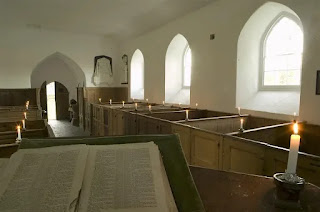'A prayer excellent to the conclusion of a daily service': A Prayer of Saint Chrysostom at Matins and Evensong
This is called the prayer of St. Chrysostom, because it is almost literally taken out of a Greek Liturgy, commonly ascribed to him. The Church of England adopted it, and placed it here, not knowing where to find a prayer, or persons able to compose a prayer, more excellent, or better adapted to the conclusion of a daily service.
He points to how the Prayer of Saint Chrysostom grounds the efficacy of our prayers in the evangelical promises of Matthew 6:8 and 18:20, thus gathering up all our petitions at Matins and Evensong into these evangelical promises:
The preface contains two grounds and reasons for hoping, that our prayers will be accepted: Our present experience of God's grace, which has enabled us unanimously and devoutly to make our common, that is, our united supplications unto him. He who gave us this grace, we humbly trust, will grant our requests. But that we may not quit the throne of grace, till all doubt of the efficacy of our petitions is removed, we urge the infallible promise of him, who is the life and the truth, in whom all the promises of God are Yea and Amen, and who has assured us, that when two or three are gathered together in his name, he will grant their requests. We beg him to fulfil the desires of our hearts, and the petitions of our lips; but with this reserve, only so far as his infinite wisdom knows it expedient for us, learning from his example to submit our will to the will of God.
And it is on this basis that we make two petitions of the Prayer of Saint Chrysostom itself:
For two things however, without any apprehension of appearing arrogant, or presumptuous, we positively and importunately pray; the knowledge of all necessary religious truth in this world; and when we pass out of this world into the world to come, life everlasting: Being fully assured, that if these two points, the knowledge of God here, and the enjoyment of him hereafter be secured, every thing else is comparatively of little value.
Note how, as Shepherd carefully indicates, we pray for "the knowledge all necessary religious truth". Hence the respective petition in the Prayer is not 'granting us in this world knowledge of all thy truth'. Rather, we pray for "knowledge of thy truth": that is, that which is sufficient for our salvation. Indeed, the opening phrase "granting us in this world" brings to mind the Apostolic exhortation:
For now we see through a glass, darkly; but then face to face: now I know in part; but then shall I know even as also I am known.
There is, then, no 'knowledge of all thy truth' in this world. Our petition is, rightly, more modest, recognising that now, in this transitory life, we can but "know in part".
The final petition, "and in the life of the world to come life everlasting", echoes the closing affirmations of both the Apostles' and Nicene Creed. That the Prayer of Saint Chrysostom thus ends with an expression of the Christian hope is a quietly beautiful way of bringing us at the close of Matins and Evensong to place our daily living in light of the fulfilment of all things. What is more, by using the modest language of the Creeds, it reminds us that the Christian hope is not about apocalyptic Enthusiasm but, rather, the call of the Apostle:
let us, who are of the day, be sober ... Wherefore comfort yourselves together, and edify one another, even as also ye do.




Comments
Post a Comment